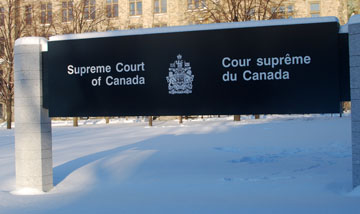The Supreme Court of Canada starts its winter session today. Here are the scheduled appeals for this week, including the refugee appeal of alleged war criminal Rachidi Ekanza Ezokola from the Democratic Republic of Congo:
 Jan. 15
Jan. 15 — Newfoundland and Labrador —
Marine Services International Ltd. v. Estate of Joseph RyanConstitutional law: Joseph and David Ryan drowned after their fishing boat capsized. Their estates and families sued a number of defendants for negligence in the design, construction, and inspection of the boat. The defendants applied to the Workplace Health Safety and Compensation Commission, which determined the action was statute-barred. Upon judicial review, that decision was set aside and the majority of the Court of Appeal upheld the reviewing judge’s decision. There are several constitutional issues raised in this case.
Jan. 16 — British Columbia —
Nishi v. Rascal Trucking Ltd.Property law: Hans Heringa owned Rascal Trucking Ltd. and developed property with Cidalia Plavetic, who was a realtor and principal of Kismet Enterprises Ltd. In 1996, Rascal Trucking signed a five-year lease to use part of the property for a topsoil processing plant. After some complaints, the City of Nanaimo ordered the topsoil be removed. The order was not complied with so the city removed the topsoil at a cost of $110,679, which was lodged against the property as tax arrears. Plavetic stopped making mortgage payments. The CIBC foreclosed on the property in 1997 and paid the money to redeem the property from a tax sale. In 2001, a vesting order was granted with title being transferred to Edward Nishi for $237,500. Heringa helped him with the financing by advancing $110,679 and signing as covenantor. Nishi refused Heringa’s request for an ownership interest in the property. Nishi and Plavetic have lived on the property as a common law couple since 1997. Years later, Rascal Trucking sued Nishi to acquire a 50-per-cent interest in the property and a caveat was filed against the property.
Jan. 17 — Federal Court —
Ezokola v. Minister of Citizenship and ImmigrationImmigration law: Rachidi Ekanza Ezokola was the economic adviser and second counsellor of embassy to the Permanent Mission of the Democratic Republic of Congo to the United Nations before seeking refugee protection in Canada for him, his wife, and their eight children. The Refugee Protection Division of the Immigration and Refugee Board denied his application for refugee protection on the basis of complicity by association in war crimes and crimes against humanity that were committed by the DRC. The Federal Court allowed Ezokola’s application for judicial review and the Federal Court of Appeal allowed the appeal. The main question in this case is what is the correct legal standard for culpable complicity in international crimes?
Jan. 18 — Alberta —
Pham v. R.Criminal law: Hoang Anh Pham is a Vietnamese citizen who came to Canada under his father’s sponsorship. He was convicted of producing and possessing marijuana for the purposes of trafficking and sentenced to two years in jail. He appealed his sentence, arguing that the consequences of the sentence with respect to the Immigration and Refugee Protection Act should have resulted in a reduced sentence. The Crown consented to the reduction. The Court of Appeal dismissed the appeal. The central question in this case is how should a criminal or appellate court consider the unintended or collateral consequences of a criminal sentence, particularly consequences relating to the immigration status of an offender?

 Jan. 15 — Newfoundland and Labrador — Marine Services International Ltd. v. Estate of Joseph Ryan
Jan. 15 — Newfoundland and Labrador — Marine Services International Ltd. v. Estate of Joseph Ryan